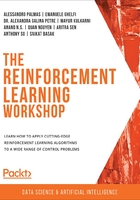
Summary
RL is one of the fundamental paradigms under the umbrella of machine learning. The principles of RL are very general and interdisciplinary, and they are not bound to a specific application.
RL considers the interaction of an agent with an external environment, taking inspiration from the human learning process. RL explicitly targets the need to explore efficiently and the exploration-exploitation trade-off appearing in almost all human problems; this is a peculiarity that distinguishes this discipline from others.
We started this chapter with a high-level description of RL, showing some interesting applications. We then introduced the main concepts of RL, describing what an agent is, what an environment is, and how an agent interacts with its environment. Finally, we implemented Gym and Baselines by showing how these libraries make RL extremely simple.
In the next chapter, we will learn more about the theory behind RL, starting with Markov chains and arriving at MDPs. We will present the two functions at the core of almost all RL algorithms, namely the state-value function, which evaluates the goodness of states, and the action-value function, which evaluates the quality of the state-action pair.